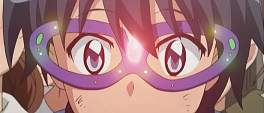Why would one decide to watch Futatsuki no Kichi when the first season of Zero no Tsukaima is (to paraphrase Yahtzee) a cavalcade of mediocrity? Perhaps it's the simple reason that Futatsuki no Kichi (The Rider of the Twin Moons) improves upon its predecessor in all respects and manages to find its footing in both humour and characterisation.
Gone are the staple characters of the first season, swiftly cast aside and replaced with fresh (female) faces; gone are the tepid attempts at humour now supplanted by copious amounts of fan-service, yuri and slapstick; and gone is the bloodless and pitifully shallow plot, storylines are now replete with pathos the first season couldn't hope to muster. This is not to say that the series is universally excellent, a satisfying conclusion is the most glaring omission, however its new-found confidence makes it far more entertaining and engaging to watch. The increased production values help this along, the animation is still by JC Staff but while characters and backgrounds feel similar, details and flourishes add to the overall feeling of assuredness.
The opening minutes are all it takes to realise things are going to be different, a bait-and-switch designed to confuse existing viewers and bring new ones up to speed; with this formality over the plot continues where it left off: once again revolving around the interminable idiot Saito and the incompetent mage Louise, the plot reveals extra layers with the backdrop of war and the quest for honour by the noble class. Intentions are made crystal clear when all the male mages are shipped off to battle leaving the academy with Saito, a quickly ignored pretty boy (Guiche 2.0) and a surplus of females all too willing to strut about in their nightwear. Louise's character is given the most attention, her tsunderreko status given, albeit thin, context by introducing her busty yet surprisingly tolerable sisters, while the latter part of the series sees her relationship with Saito grow as well as her raison détre spelled out. We are only sporadically reminded of her status as a void mage and thankfully her supposedly immense power is never used as a deus ex machina and she only manages to successfully utilise it once. Old favourites are developed with mixed results: Henrietta oscillates between caring monarch and sultry vixen while Siesta turns into a painful cliché whose only merit is to provide cosplay interludes.
The new face of Agnes drives a large portion of the series' story and while initially abrasive, her back story is both painful and revealing if not particularly original. The series really shows its teeth with the death of one of the more likeable characters and demonstrates a deftness rarely seen in an otherwise fluffy anime. It's this trait which makes the series feel almost bi-polar in places, switching without warning from touching sentimentality to slapstick comedy, providing little time to turn off what small part of the brain this series utilises to enjoy the humour, the worst offender is the finale of the final episode; perhaps this is a minor point given the quality of both aspects of the show but it prevents one from feeling too much for the characters or laughing enough at the comedy.
The most significant detractor for Futatsuki no Kichi is that nothing is ever resolved. The antagonist introduced early on is given criminally little screen-time and disappears as the series concludes; Saito and Louise's relationship sometimes seems to stumble forward but ultimately reverts to its starting position of abusive master and perverted slave; even the water spirit side-story from the first season is only given a passing mention. With its apparent ability to craft worthwhile character development it seems odd that the series would miss such blatant openings for advancement: Saito's status as a Gandalfr is never elaborated upon and his ability to wield weapons of war while simultaneously being staunchly against the idea seems a prime target for investigation yet he is given the typical "I don't want to kill" ethos. Kirche, Tabitha, Guiche and Montmorency are all but ignored even given the first-season revelations regarding Tabitha and Guiche's forced enlistment, Kirche's character even takes a step backwards as she is shown to be impatient and impulsive rather than the adept, calculating mistress of before.
Futatsuki no Kichi is of the quality the first season should have been: the humour is genuinely funny and the characters affectingly likable. Nothing stands out that would set this series apart from any of the other myriad comedies out there, many of the aspects it holds dear are tried and tested, perhaps not in the same setting, but the ease of watching lies in the familiarity of knowing what will come next. With further source material out, it's no doubt that JC Staff have created a franchise they will no doubt exploit; whether the next instalment will provide the same leap in quality as this series provided is unlikely but for the present, Zero no Tsukaima is harmless, woolly entertainment.











